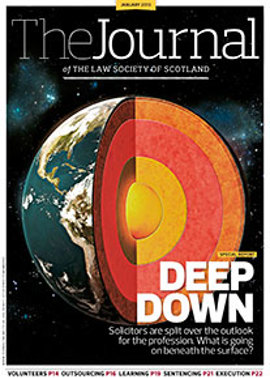Entitled to be aggrieved

This article focuses on an important ruling from the Supreme Court, Walton v Scottish Ministers [2012] UKSC 44 (on appeal from [2012] CSIH 19). It concerned an unsuccessful appeal by Mr Walton to stop the £400 million Aberdeen Western Peripheral Route (AWPR), promoted by the Scottish ministers under the Roads (Scotland) Act 1984.
From a legal point of view the interesting and important outcome of the case relates to the court’s consideration of who may be a “person aggrieved” for the purpose of bringing a statutory appeal. The scope of interpretation is important, as it is only a “person aggrieved” who will have the legal standing to appeal decisions of the Scottish ministers and local authorities in roads, planning and related matters.
This requirement has received judicial attention over many years. The Inner House in this case determined that Mr Walton was not entitled to bring a challenge as he was not a person aggrieved, and that he had not shown his interests to have been “substantially prejudiced” so as to entitle the court to quash the statutory schemes and orders necessary for the AWPR. The Inner House did not consider it sufficient that he opposed the AWPR and had strong opinions about it. It was concerned that Mr Walton’s property was located some miles away and he therefore could not be substantially prejudiced by the AWPR. To meet the legal test, his interest required to be elevated above that of a member of the public who opposed the AWPR.
Genuine interest
The Supreme Court took a very different and broader view, and noted that when considering whether an individual is a person aggrieved, the legislative and factual context will be important. The court looked to Mr Walton’s participation in the consultative procedures under the Roads Act and concluded that he was indubitably such a person.
The court further confirmed that it would be inconsistent with environmental law to require that a person’s private interests must necessarily be affected to meet that requirement.
It was explained that environmental law proceeds on the basis that the environment is of legitimate concern to everyone, and its protection is in the wider public interest.
Lord Reed (at para 88) stated: “He [Mr Walton] is not a mere busybody interfering in things that do not concern him. He resides in the vicinity… He is an active member of a local organisation concerned with the environment… He has demonstrated a genuine concern about what he contends is an illegality in the grant of consent for a development which is bound to have a significant impact on the natural environment.”
Similarly, Lord Hope commented (at para 152): “Does the fact that this proposal cannot reasonably be said to affect any individual’s property rights or interests mean that it is not open to an individual to challenge the proposed development on this ground? That would seem to be contrary to the purpose of environmental law, which proceeds on the basis that the quality of the natural environment is of legitimate concern to everyone. The osprey has no means of taking that step on its own behalf, any more than any other wild creature. If its interests are to be protected someone has to be allowed to speak up on its behalf.”
Necessary link
The outcome is that who qualifies as a “person aggrieved” should not be as restrictively interpreted as indicated in the Inner House. It is, however, somewhat difficult to establish clear guidance for ensuring that a person challenging decisions will meet the criteria of a person aggrieved. It would be prudent for that person to have objected at the appropriate stage to the proposal in relation to which the decision was made, and to have participated in the decision-making process.
The linkage between Mr Walton’s arguments and the wider environmental concerns appears to have been important in establishing him as a person aggrieved. In circumstances where a linkage with wider environmental issues cannot be demonstrated, it might be difficult to establish that the requirements are met.
The Supreme Court also made a further important observation that even where a defect has been demonstrated, the courts retain the discretion to refuse to quash the decision where to do so would be against the overall public interest.
In this issue
- Off on the wrong track
- Cadder, EU style
- Common grazing shares – where are we now?
- Is it time to stop baffling our clients/customers?
- Copyright and collaboration: a dose of bad medicine?
- Reading for pleasure
- Opinion column: Ken McCracken
- Book reviews
- Council profile
- President's column
- New build: new process
- Up or down? Digging deeper
- Who volunteers to be discriminated against?
- What's your LPO strategy for 2013?
- Tailored to suit
- Perfect storm less than appealing
- Separate but legal
- In and out of court
- Coming to a court near you
- Which way will the wind blow?
- Entitled to be aggrieved
- Funds less restricted
- Statement or Budget?
- Local leg-up
- Scottish Solicitors' Discipline Tribunal
- Answering for error
- The other alternative
- Remoteness and risk
- Paralegal Scheme extended
- Proposed rule change
- Law reform roundup
- An innocent loan or questionable funds?
- Ask Ash






